‘There is no greater editor or rewriter of your stand-up comedy than the audience’: Vir Das
Shefali Shah, Jim Sarbh and Vir Das, nominated for the International Emmy Awards 2023, were at a recent Express Adda in Mumbai, where they spoke on performing, not being boxed in categories and looking for good stories.
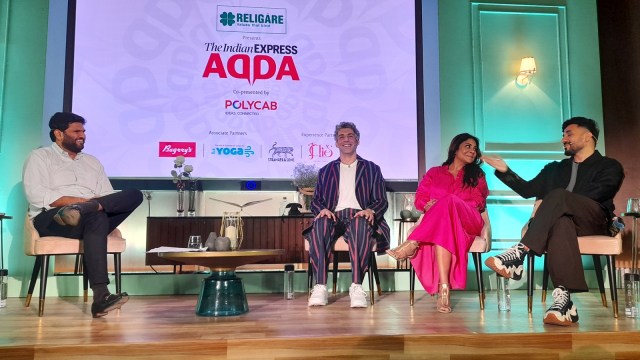 (From right) Stand-up comedian Vir Das and actors Shefali Shah and Jim Sarbh with Anant Goenka, Executive Director, The Indian Express Group.
(From right) Stand-up comedian Vir Das and actors Shefali Shah and Jim Sarbh with Anant Goenka, Executive Director, The Indian Express Group. Shefali Shah, Jim Sarbh and Vir Das, nominated for the International Emmy Awards 2023, were at a recent Express Adda in Mumbai, where they spoke on performing, not being boxed in categories and looking for good stories. Das won the award this week in the comedy series category for his stand-up special, Vir Das: Landing
On what defines mainstream
Vir Das: I think when people come to see you for you, with just the expectation of you existing, perhaps that’s mainstream. Where they’re like, I just love this person, I admire this person so much that I’m just showing up for them. I don’t think comedians relate to that too much because when you show up, first there’s a gigantic expectation — here’s what I want from you, and here’s what I paid for. So I think that might be mainstream.
Jim Sarbh: I think, in general, people create this versus this, and all these little categories for where you should fit in or what it means to be within that category. And I don’t really think about it very much, I wish people didn’t do it. I think that you should just try to do projects that you’re interested in doing and that you think make for a good story. Beyond that, I try not to worry too much about all of the rest.
Shefali Shah: I think earlier there was a predominant wall, particularly for women. When you look back at the ’60s and ’70s, there were films made for women of any age group, whether it was Aandhi (1975) or Anupama (1966) or Aradhana (1969). Then came a period where the heroine had a shelf life from 18-22 or 25. And they didn’t know what to do with real human beings beyond the age of 22. But now, though, there are stories being told, whether it’s Tumhari Sulu (2017), Lipstick Under My Burkha (2016). So I’m glad it’s moving. That line is kind of dissipating and I have to give it to somebody else for having paved that path for me, whether it’s Shabanaji or Smita Patil. Somebody was working on that line and that line is kind of blurring. I really wish it gets erased.
 Actors Jim Sarbh, Shefali Shah and Vir Das, who have been nominated for the International Emmy Awards 2023, at the Express Adda in Mumbai on Monday. Narendra Vaskar
Actors Jim Sarbh, Shefali Shah and Vir Das, who have been nominated for the International Emmy Awards 2023, at the Express Adda in Mumbai on Monday. Narendra Vaskar
Das: The one thing they have in common is still stories, right? And one might be a slightly more fictionalised version of that story. The way I look at it is there’s news and then there’s mainstream news and one of those is slightly more fictionalised than the other. So mainstream media is just like mainstream cinema.
On whether the appetite for truth is more now
Sarbh: I don’t know what the appetite for truth was like 25 years ago but I do know that I have been in a lot of films based on true events. Right from Neerja (2016), which was based on a real situation, Sanju (2018), Padmaavat (2018), Mrs Chatterjee vs Norway (2023), A Death in the Gunj (2016), and Rocket Boys. Maybe people are just realising that there are really good stories out there in India that haven’t been looked at or given precedence or the time to be turned into something entertaining to watch. Maybe that model is changing. Maybe now we are looking more internally and finding interesting true events to fictionalise in a way that will be exciting.
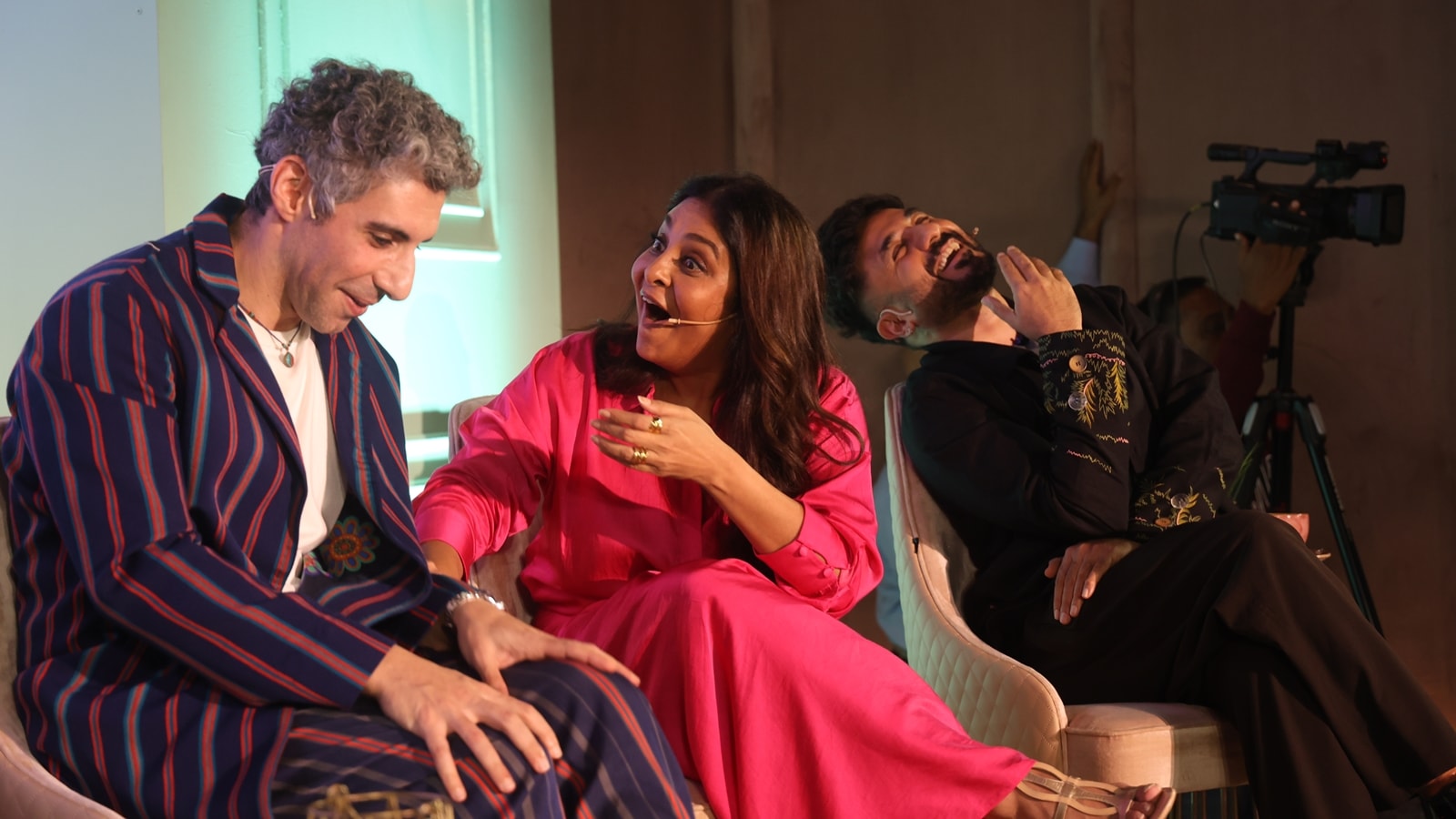 Stand-up comedian Vir Das and actors Shefali Shah and Jim Sarbh
Stand-up comedian Vir Das and actors Shefali Shah and Jim Sarbh
Shah: The one thing that occurred to all of us who were creating Delhi Crime was, when you’re creating a show on a real life case, you need immense sensitivity. It’s a lot of responsibility. People have already gone through it, you don’t need to come back and rub it in their face. Delhi Crime was more about what happened after — the five days that followed the incident. It could have been sensationalised. When we won the Emmy for Delhi Crime (in 2020), we could have really gone all out and celebrated but we all knew that it was a show on somebody who was terribly hurt. It was a loss of life. And we won on that show. So it was a juxtapose of sorts.
Sarbh: Yes, I think about that with Rocket Boys as well. We haven’t had to use the atom bomb or the nuclear bomb, and that would change everything. It would change everything about how we looked at Homi Bhabha if that was the case, like how when we saw Oppenheimer (2023), it’s more or less a tragedy you are watching unfold in front of your eyes and not a heroic tale of this person that strived at a time when there were no resources. Whereas Rocket Boys could be that because we’ve not used the bomb. I really did think about that a lot when Delhi Crime came out. Like what does it mean to take a tragedy and turn it into a hit show. It’s a very odd juxtaposition.
 Stand-up comedian Vir Das and actors Shefali Shah and Jim Sarbh with Anant Goenka, Executive Director, The Indian Express Group.
Stand-up comedian Vir Das and actors Shefali Shah and Jim Sarbh with Anant Goenka, Executive Director, The Indian Express Group.
On how much truth is there in a stand-up act
Das: Not much, to be honest. Stand-up comedy is one of two things, right? It’s either that you’ve said the thing in the room that everybody was thinking, and you needed an idiot to show up and say it for everybody else. Or you’ve said the thing in the room that nobody’s thinking, and then it’s a battle. So the premise of the joke is either agreement or complete disagreement.
If it’s disagreement, it has to turn into something ridiculous that then eases the discomfort. But otherwise, it’s just agreement. So the truth is never so much said in stand up. It’s just a feeling that we all kind of agree on. And then it goes into something ridiculous within a few seconds.
 Jim Sarbh with his mother Lalerukh Sarbh
Jim Sarbh with his mother Lalerukh Sarbh
On whether the line in stand-up is set by the audience
Das: There is nothing worse in this world than silence from an audience. There is no greater teacher than an audience. There is no greater editor or rewriter of your stand-up comedy than the audience. And they will change the line. There are jokes that you would have done in 2012 or 2009 that were evolved then and would be considered unevolved or uncivilised right now, the audience taught you that. So our evolution comes from the audience.
(Our) audience is the most diverse audience in the world. We’re like this big joint family that’s having dinner together at a festival. And someone’s going to hate the bhindi and somebody is going to love it and somebody’s going to want the chana. It’s just that we’re all together. But what I love about my art form is that we can fundamentally disagree about it, but laugh about it under the same roof. These are just words, at the end of the day… Now, something that I would love the audience to know is, if you ever hear a joke you don’t like, wait 30 seconds and there’ll be a joke about somebody else. It’s usually because the joke is about you. But comedians are not coming at this from a place of power… My job was created so that kings could be humanised for their subjects. My job was created so big stars in the world could be humanised and be seen as fallible, and my job was to dance until you saw them as human beings. Now, don’t be mad because I pointed out the cracks. All I have to work with is the cracks. But Japanese people fill gold in the cracks. That’s what we’re doing here. So that the next time you think of something that’s dark, the next time you think of something that went wrong, you associate laughter that I brought to it with you. So let me dance, that’s what it is.
 Stand-up comedian Vir Das and actors Shefali Shah and Jim Sarbh
Stand-up comedian Vir Das and actors Shefali Shah and Jim Sarbh
On measuring success
Sarbh: The way that I like to measure it is — am I getting another project that is really exciting to me? That’s what makes me happy and makes me want to continue going forward. If it’s just a bunch of panel discussions and award shows, I really have to struggle to be in a good mood… I know that one feeds the other, I know that they’re all connected, I can’t pretend they’re separate. But if there was a world where nobody asked me for a selfie, but I kept getting cast in projects that really excited me, I would choose that world any day of the week. However, I know it’s all interconnected.
On whether relatability is important for an actor to succeed
Shah: I think relatability has always been there. There might be different people relating to different things. That’s why there is no good or bad or right or wrong. Rather, art doesn’t have that. It’s very subjective. Somebody else might have a completely different perspective than somebody else. But I don’t think relatability was ever the problem. I think what Jim said is absolutely right — I used to get a lot of like, ‘you are one of the finest actresses of our country’, but it didn’t translate into work. I got awards, but it didn’t translate into work. And it’s pointless. I mean, I want validation. Obviously, I want validation. But if that validation is only good enough to decorate my wall, then it’s redundant. I’ve been working for like 25-30 years but I’ve actually started getting work in the last four years. My career has been more about waiting than actually working. So yes, I don’t think there’s a problem with relatability. Relatability is never the problem with the audience. The joke is about you. But comedians are not coming at this from a place of power… My job was created so that kings could be humanised for their subjects. My job was created so big stars in the world could be humanised and be seen as fallible, and my job was to dance until you saw them as human beings. Now, don’t be mad because I pointed out the cracks. All I have to work with is the cracks. But Japanese people fill gold in the cracks. That’s what we’re doing here. So that the next time you think of something that’s dark, the next time you think of something that went wrong, you associate laughter that I brought to it with you. So let me dance, that’s what it is.
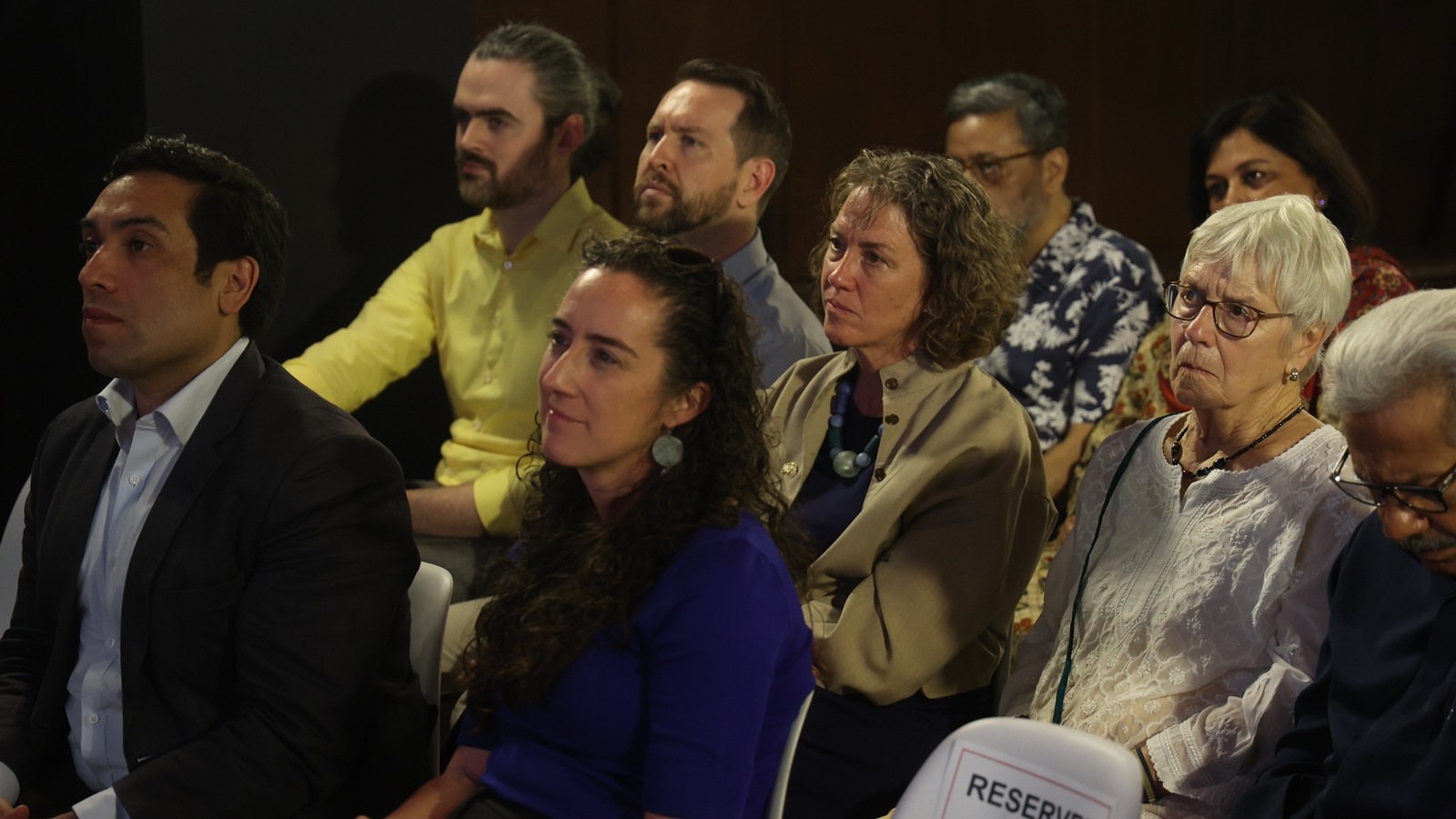
On measuring success
Sarbh: The way that I like to measure it is — am I getting another project that is really exciting to me? That’s what makes me happy and makes me want to continue going forward. If it’s just a bunch of panel discussions and award shows, I really have to struggle to be in a good mood… I know that one feeds the other, I know that they’re all connected, I can’t pretend they’re separate. But if there was a world where nobody asked me for a selfie, but I kept getting cast in projects that really excited me, I would choose that world any day of the week. However, I know it’s all interconnected.
On whether relatability is important for an actor to succeed
Shah: I think relatability has always been there. There might be different people relating to different things. That’s why there is no good or bad or right or wrong. Rather, art doesn’t have that. It’s very subjective. Somebody else might have a completely different perspective than somebody else. But I don’t think relatability was ever the problem. I think what Jim said is absolutely right — I used to get a lot of like, ‘you are one of the finest actresses of our country’, but it didn’t translate into work. I got awards, but it didn’t translate into work. And it’s pointless. I mean, I want validation. Obviously, I want validation. But if that validation is only good enough to decorate my wall, then it’s redundant. I’ve been working for like 25-30 years but I’ve actually started getting work in the last four years. My career has been more about waiting than actually working. So yes, I don’t think there’s a problem with relatability. Relatability is never the problem with the audience.
 Stand-up comedian Vir Das and actors Shefali Shah and Jim Sarbh with Anant Goenka, Executive Director, The Indian Express Group.
Stand-up comedian Vir Das and actors Shefali Shah and Jim Sarbh with Anant Goenka, Executive Director, The Indian Express Group.
Rapid fire with Shefali Shah, Jim Sarbh & Vir Das
One recent film whose success surprised you.
Sarbh: Darlings (2022). I was like yay!
Shah: Gadar 2 (2023).
Das: There’s a film called Talk To Me (2022), which is a very nice horror movie.
One piece of advice you have for somebody who says I want to be like you.
Sarbh: I’m taken.
Shah: I’m not my type. So I don’t think you should be either.
Some new aspiring actor says I want to grow up to be like Shefali Shah.
Shah: You don’t want to be like me. I’ve waited way too long. And I’ve given birth to two brats. So you don’t want that.
Education or experience, what’s more important for your profession?
Sarbh: Experience.
Shah: Experience.
Das: Experience, completely.

The one thing you like about Indian entertainment.
Sarbh: That it’s exploring long-form storytelling in a very exciting new way.
Shah: And it’s exploding as well.
Das: That an audience will feel as much as the people on screen or on stage. We have the most feeling audience in the world. I love that.
What’s the one thing you don’t like about entertainment?
Das: That in the entertainment world we have to get accustomed to discomfort.
Shah: I think the lack of identifying that the actor and the character aren’t the same.
Sarbh: Oh yes. But it’s okay to not like something. Don’t watch it.
The OTT platform you personally spend the most time watching.
Shah: Netflix and Apple.
Das: Netflix.
Sarbh: Probably Netflix and Amazon Prime.
Which word irritates you more: content or crossover?
Sarbh: Content.
Shah: They’re both annoying.
Das: Traction irritates me.
++++
SHEFALI SHAH
Winning the Emmy or achieving pay parity for women in the industry — what would you choose?
Why should I choose? I want both.
If you were offered to play a lead role in The Kerala Story (2023), the film produced by your husband, would you
take it?
I don’t have anything to do with politics. I shared the trailer of it. I cannot tell you how badly I got trolled, like people hated me overnight. If I was offered it with the evidence, why not? It’s as important to be told as Delhi Crime is. But if there was no evidence, and it was just imaginary, I would be very wary of it.
You have played Akshay Kumar’s mother. A contemporary whose mother you wouldn’t mind playing today.
I played the mother of Akshay Kumar, who is older than me. Finished now for life.
Do you view Delhi Crime 2 as your best performance yet?
If there was one performance that I probably deserved to be nominated for, it’s Delhi Crime.
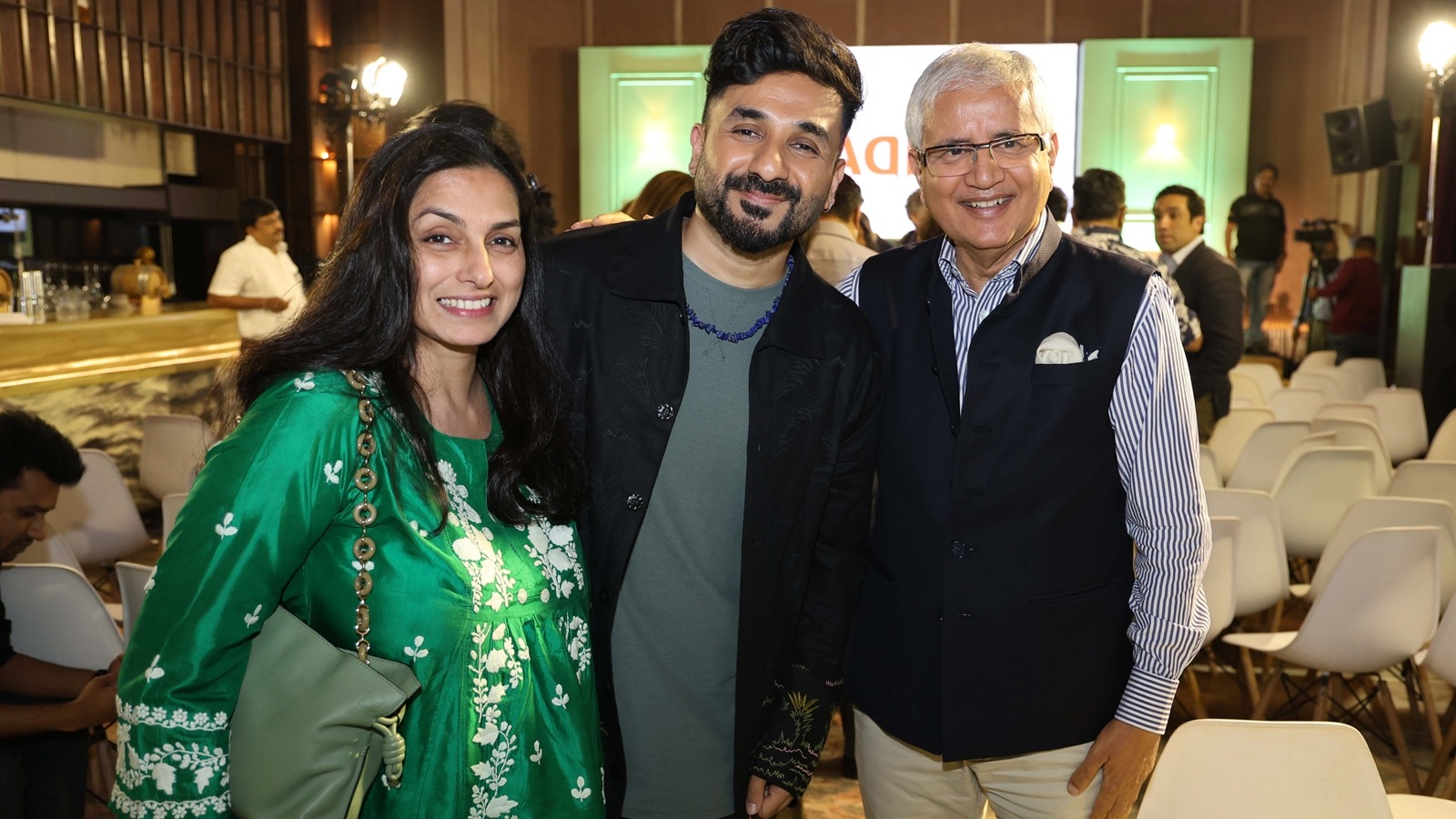
VIR DAS
The one thing common between your two ‘Indias’?
That they both love it.
One advice for Kunal Kamra.
Keep going, keep writing. You’re funny as hell.
If you have to go back and perform Walking on Broken Das, would you change any of the jokes?
No, it’s the first stand-up comedy show in India to play at the NCPA and Tata Theatre. It’s imperfect and it’s bad, but it means a world of things to me.
The one topic or subject or person you’d never make fun of on stage.
There isn’t one.
Of all the anecdotes in Landing, how many are 100 per cent accurate?
I would say that of Landing, 85 per cent of the show is very accurate.
Is Landing your best performance yet?
I’m writing it right now.
Who is the better muse for you? Modi or Rahul?
I think they inspire your publication more than they inspire me collectively.
Trump or Biden.
Trump, for sure.
Smriti Irani or Mahua (Moitra)?
I wouldn’t make fun of either one of them. I think they do it to each other quite a bit already.
Arvind Kejriwal or Mamata Banerjee?
I would say Arvind Kejriwal.
Four options: Netanyahu, Putin, Xi Jinping or Erdogan.
Vladimir Putin, for sure.
JIM SARBH
The one thing you discovered about yourself while making Rocket Boys.
That I don’t like wearing a fat suit under a three-piece suit. It was hot!
The one thing common between you and Homi Bhabha.
Parsi.
The one thing you admired the most about Homi Bhabha.
His curiosity.
The one thing you ended up disliking about him.
Similar to me, when younger, very hot headed, arrogant, blunt in the way he transmits information, especially to the people he loves.
Is there any one thing you decided to admire about Nehru?
So many things. When I started reading Nehru’s work, I saw that a lot of things that Homi Bhabha had said later, he (Nehru) had said in his earlier books.
One piece of advice you’d give young actors, if they say they want to learn from your process.
Rehearse.
Do you believe Rocket Boys 2 is your best performance yet?
It’s not for me to judge. I like it because it gave me the opportunity to play so many different shades of one person.
The one Indian artist, whose biography you’d love to play the lead role in.
Souza (FN) or MF Husain.
The one foreign artist whose biography you’d play a lead role in.
Picasso.
***
Audience Questions
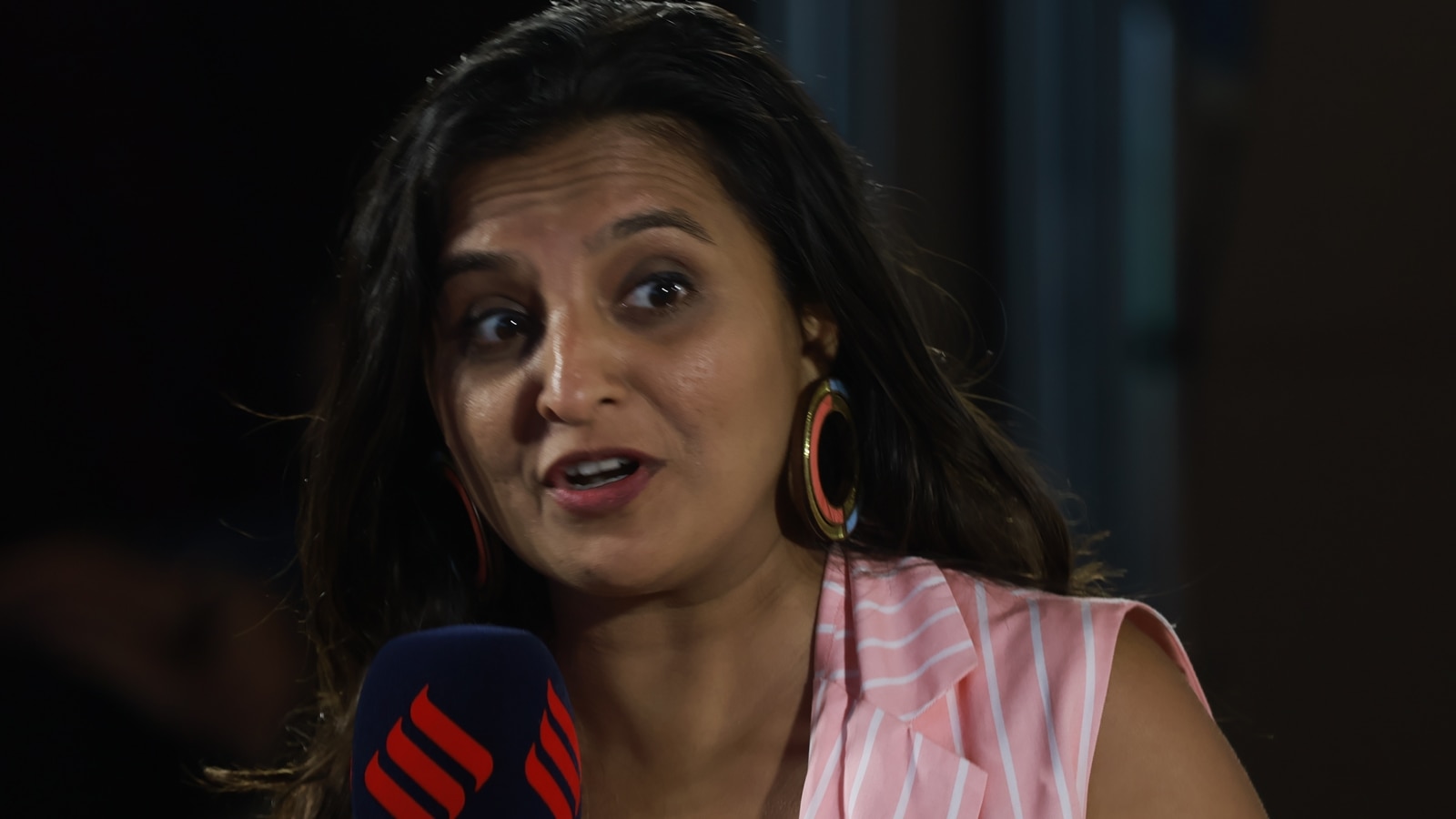
Devna Vora Gandhi
Entrepreneur
Jim, you have an incredible fluidity in your characters, in your costumes, in your way of speaking, and a masculinity which is away from the insane machoness that one has to prove as an actor in this profession. How did you grow up so comfortable?
Sarbh: Anything that seems to stamp its authority all the time is just unappealing to me. And it just doesn’t seem exciting or interesting to me. I’d rather be flowing with a room or grooving or floating about or swimming. I’d rather move through life swimming than be rigid, certain, and defined. I think everyone has it. The more you get in touch with yourself, the more you realise that it might as well express itself.
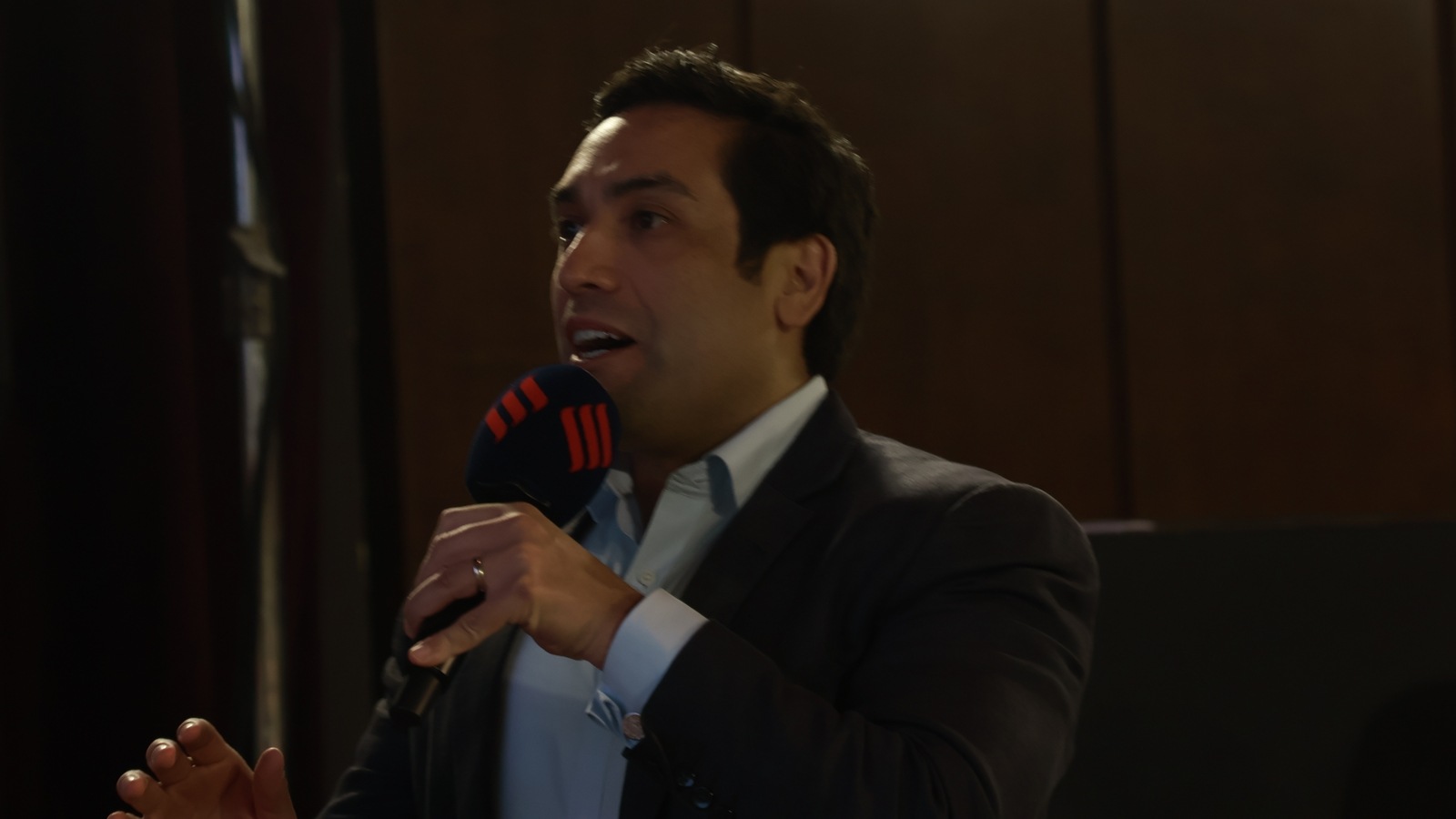
Greg Pardo
Spokesperson, US Consulate
I’m just amazed to see how the world has an opportunity to see different aspects of India in the past 10 years. How have you seen your work show India to the world?
Shah: I have to give credit to the OTT platforms. If Netflix wasn’t there, I don’t know if my work would have gone around the globe. So it’s incredible, not just as a creative person, but also as a student of creativity. I can watch content from everywhere. I can watch it in complete silence or just with subtitles or in a language that I don’t understand. Also, I think people are being brave enough to tell real stories. Interestingly, we’re getting pretty unapologetic about it. I think it’s unfair to conceptualise the entire country and all these people just by one particular show, film, or character. Everything is so vibrant. And with the OTT platforms, we’ve seen work from all over. It’s not a competition, it’s an inspiration. So all of us want to say, let’s make it even better. And suddenly, it’s not about the language, it’s just about an emotional language that everyone across relates to and understands.
Das: I think there used to be, until recently, five palatable things that the US or the UK, knew about us. And sometimes, the content that got recognition represented those five palatable things. At least comedically, America is a country where what you find is that ‘funny’ is deeply rooted in identity. There are people who find Seinfeld funny, people who find John Oliver funny. And then there are people who find Joe Rogan funny, and their ideology and their identity is very clearly defined and sometimes they can’t laugh at each other so much. When I come to America, I get to broad-base tackle your entire culture without any agenda whatsoever. So in fact, I find more comedic freedom to make fun of all of America, than an American comedian would sometimes because the agenda is not identity-rooted. But I think because you consume those palatable versions, now the desire is, take me someplace new, and why the hell not? When I was in college, and I’d get my American friends to watch Hindi movies, they’d be like, we love it. But you know, it’s very glamorous, there are very loud costumes, and it all feels like there are revenge storylines, and the guy falls down from a building and he doesn’t die. And then you go, you make 150 Marvel movies. It’s your Bollywood.
Sarbh: The more local, rooted and true you are to an actual experience, the more universal it becomes.
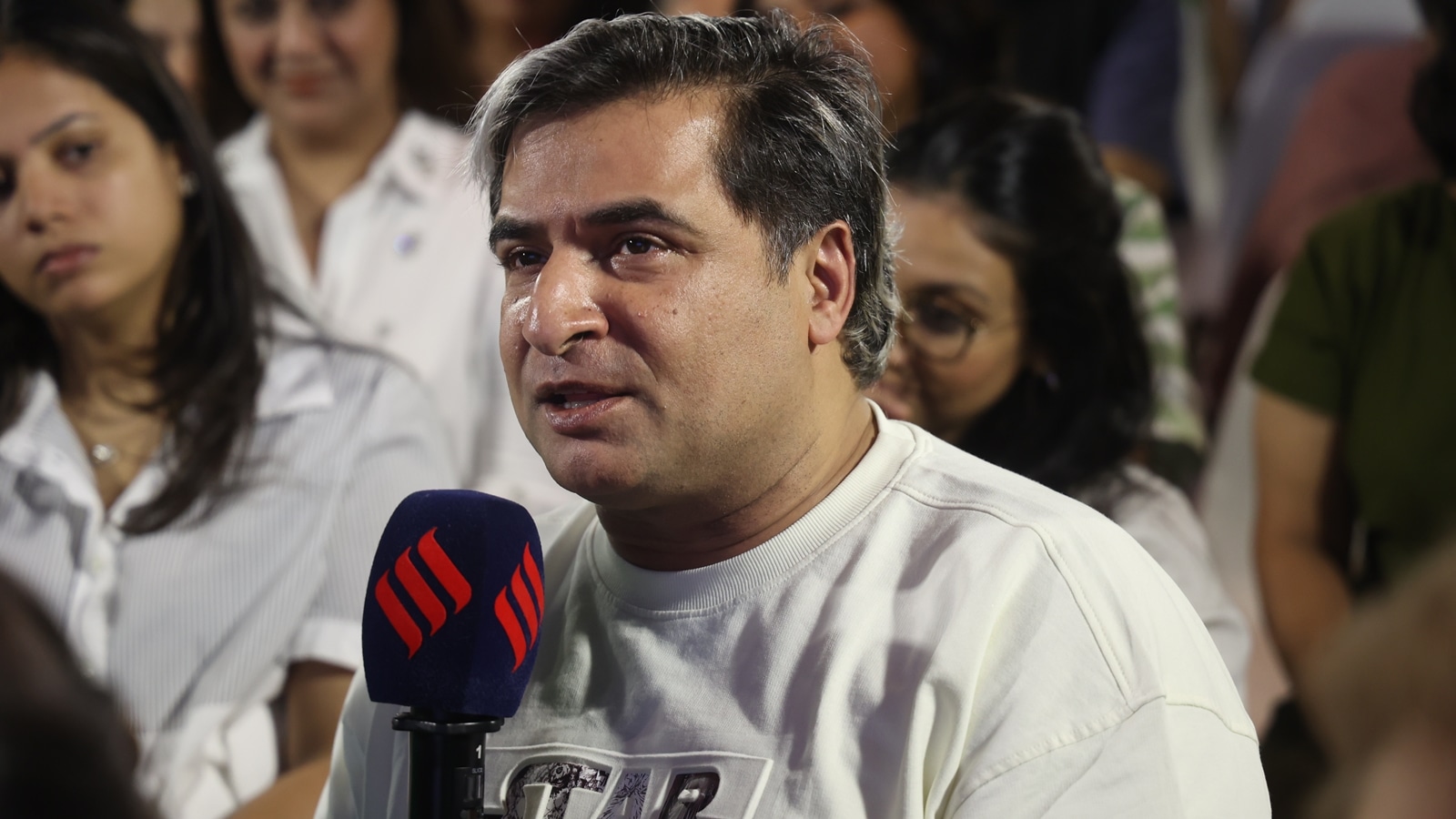
Suvir Saran
Chef and Columnist
I’ve been a gay man for the last 47 years of my life, and pronouns are something I struggled for. Vir, India has changed. when you’re not using pronouns during your comedy shows, what do you think of them in India? About their usage, silencing them or not looking at them.
Das: I’m happy to call you whatever you feel like you deserve to be called simply because the more fluid and happy your life is, the less rigid my life is. So I think it’s an idea of freedom to decide what you will be called instead of other people deciding what to call you. So, I am happy to call you whatever makes you feel good.

Rashmi Bansal
Author
How do you all prepare for real-life characters? Shefali, you played a real-life officer in Delhi Crime. did you meet her to portray her? Or did you come up with your own interpretation? similarly, for Jim, to portray Homi Bhabha, did you study him, or see his paintings? Or should an actor take artistic liberty and imagine what they were like?
Shah: I had the honour of meeting Chhaya Sharma. She’s the one who cracked the case. I met her for two hours over a coffee, and you cannot absorb an entire person in two hours. She was very kind. She was available every time I had a question. But I think all those are technical things. She had cracked the case but what she felt is what all of us felt. We felt pain. We were angry. It was personal. And we were asking the same questions. So the emotion was right. But there is a protocol of being in that uniform. I remember we were shooting the interrogation scene. And I thought if I am getting the opportunity of a lifetime to sit like Mr Bachchan, sleeves have to be rolled up. I asked Chhaya ma’am, who said, just remember that it was in January and it was one of the coldest Januarys there was. And we did not have a heater in the room.
Sarbh: Luckily, if I had met Homi Bhabha, it would have been very spooky. But a lot of people have written about him. The pressure first falls on the writers, the research team, and the director, and they provide you with things to help your research along. And then, of course, you go down avenues based on what you get interested in or what is pertinent for the scene. Because I can’t be Dr Bhaba, it’s impossible. But I can try as best as I can portray some of the qualities. So we read so many wonderful things about him. He was always described as a Renaissance man. Not only was he interested in science, but also in politics, architecture, in art, he could play the violin as well as anybody in a symphony orchestra. And despite all of that, he also had a very active social life. He had great wit, he didn’t take himself very seriously. So then you try to concoct this character based on all of these things. So how do you represent somebody who thinks faster than you? You struggle with the problems, and you struggle with the problems for days, weeks, maybe months, whereas the character solves it in a split second. The most fun of working on Rocket Boys was jamming with the director to come up with the approach that someone who thinks a lot faster, deeper, and broader than us would do.







